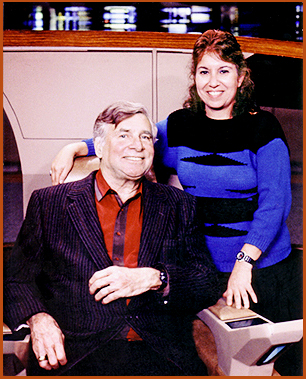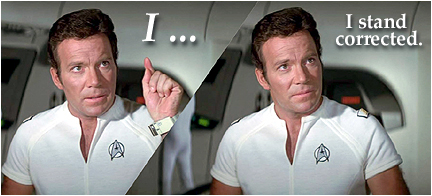-
Welcome! The TrekBBS is the number one place to chat about Star Trek with like-minded fans.
If you are not already a member then please register an account and join in the discussion!
You are using an out of date browser. It may not display this or other websites correctly.
You should upgrade or use an alternative browser.
You should upgrade or use an alternative browser.
Gene Roddenberry Biographies
- Thread starter GulBahana
- Start date
This thread would probably be better over in the Lit section.
Of the Roddenberry bios, definitely avoid the James Van Hise biography. (Though it's the only one that goes in depth on Roddenberry's Tarzan movie script.)
The authorized biography, David Alexander's Star Trek Creator isn't bad, but there are better options.
Joel Engel's biography is very good, but it's also quite critical. Major sources, for instance, were D.C. Fontana and David Gerrold, who had obvious axes to grind.
Lance Parkin's, The Impossible Has Happened, is very readable. Besides being the most recent (and thus, the easiest to find), it's comprehensive and fair.
Yvonne Fern's Gene Roddenberry: The Last Conversation is often lumped in with the Roddenberry bios in discussion, but it isn't, really. It's an interesting book to read, but it's also controversial in that the conversation described almost certainly did not happen.
The authorized biography, David Alexander's Star Trek Creator isn't bad, but there are better options.
Joel Engel's biography is very good, but it's also quite critical. Major sources, for instance, were D.C. Fontana and David Gerrold, who had obvious axes to grind.
Lance Parkin's, The Impossible Has Happened, is very readable. Besides being the most recent (and thus, the easiest to find), it's comprehensive and fair.
Yvonne Fern's Gene Roddenberry: The Last Conversation is often lumped in with the Roddenberry bios in discussion, but it isn't, really. It's an interesting book to read, but it's also controversial in that the conversation described almost certainly did not happen.
Joel Engel's biography is very good, but it's also quite critical. Major sources, for instance, were D.C. Fontana and David Gerrold, who had obvious axes to grind.
That it was critical was one of the reasons I liked it. I prefered something that wasn't as rose-colored as the Alexander bio.
Yvonne Fern's Gene Roddenberry: The Last Conversation is often lumped in with the Roddenberry bios in discussion, but it isn't, really. It's an interesting book to read, but it's also controversial in that the conversation described almost certainly did not happen.
Oh? Didn't know that. Is there a source for that?
Oh? Didn't know that. Is there a source for that?
I was a little too brief. I explained my understanding and thinking better in this post from six years ago:
Fern wrote a long-ish introduction for the paperback which addresses the major criticism of the hardcover edition, namely that Roddenberry was too physically ill and too far into his mental decline to have had the long and deep conversations that Fern reported.
I tend to view Gene Roddenberry: The Last Conversation in the same way that I view Edmund Morris' biography of Ronald Reagan, Dutch -- the book itself is a lie, but it's a lie that reveals a deeper truth. I think that Fern invented some of her conversations in the same way that Morris invented his personal anecdotes of Reagan, but they were inventions in service of the author's search for the truth about their subject.
Steve Roby elaborates further down:
IIRC, David Gerrold accused Fern of making the whole thing up, saying that Roddenberry was simply not capable of holding any real conversation at the time the conversations in the book supposedly happened. I'd like to think the part about Heinlein's Space Cadet being the only SF novel GR could name as an influence was true, partly because it makes a certain degree of sense and partly because it supports the revisionist history from Solow and Justman's Inside Star Trek book, which says that GR basically knew SFA about SF. Their book trashes a lot of myths about GR and the making of TOS. They have their own agendas, but they provide a lot of evidence, too.
I was a little too brief. I explained my understanding and thinking better in this post from six years ago:
Steve Roby elaborates further down:
Thanks for the elaboration.

Inside Trek: My Secret Life with Star Trek Creator Gene Roddenberry by Susan Sackett is not an objective essay on GR, but it does offer a very unique insight into the Man. In the TNG episode "Encounter at Farpoint," we see Susan as the girl who shows Riker how to use the wall panels, on Enterprise, when he first boards. Then she's all checking out his ass, as he walks away. Anyway, as the title of her book implies, she was GR's secret lover (for nearly 20 years). And once she had decided to publish this book -- in Majel Barrett's living years -- she had effectively ostracized herself from STAR TREK's inner circles, which she had so long enjoyed, as GR's personal assistant.
Last edited:
In the TNG episode "Encounter at Farpoint," we see Susan as the girl who shows Riker how to use the wall panels, on Enterprise, when he first boards. Then she's all checking out his ass, as he walks away.
Susan Sackett had a walk-on role as a background performer in "The Neutral Zone." She had no lines and did not receive screen credit.
Evelyn Guerrero played the ensign, who, in "Encounter at Farpoint," shows Riker how to use the computer and then checks him out.
Of the Roddenberry bios, definitely avoid the James Van Hise biography. (Though it's the only one that goes in depth on Roddenberry's Tarzan movie script.)
As a general rule, any of the Van Hise Star Trek books are crap.
Regarding Tarzan, I know that Roddenberry completed a lengthy outline (~100 pages), which can be found buried in the UCLA special collections, but I've never seen a script. David Alexander's biography suggests there was a script, but the only primary source quoted (a June 1968 letter to Isaac Asimov) mentions a "script treatment," not a screenplay. The book's appendix does not have any dates more specific than 1968 for the script, either.
David Alexander's book is an exercise in hagiography, and it's not particularly well-written (Alexander will often get facts and even dates wrong to flatter his subject, and will excuse Roddenberry's bad behavior and then criticize others for the exact same actions, etc.). It is useful, however, because it quotes extensively from various correspondence to and from Roddenberry. There are pages and pages where Alexander does nothing but quote lengthy letters in their entirety. Ironically, Alexander's shortcomings as an author make the book more valuable now than it would be otherwise.
Joel Engel's biography is mean-spirited (he takes a needless pot shot at how fat Roddenberry was, for instance), and its major sources (Fontana, Gerrold, Solow, Nimoy) all had an axe to grind with Roddenberry. Then again, it speaks volumes that so many major collaborators had major axes to grind with Roddenberry by the end of his life, and Engel did a significant amount of archival research to support his findings, in addition to many interviews.
I wish I could recommend Lance Parkin's book (I get cited in print, which is a thrill), but it's not very good. Parkin didn't even bother to use primary sources. It's a readable summary of the Alexander and Engel biographies, but it has almost nothing new to offer (plus, the author reprints a few dubious claims from the Cushman books, which grinds my gears).
Similar threads
- Replies
- 6
- Views
- 495
- Replies
- 59
- Views
- 10K
- Replies
- 2
- Views
- 200
If you are not already a member then please register an account and join in the discussion!

